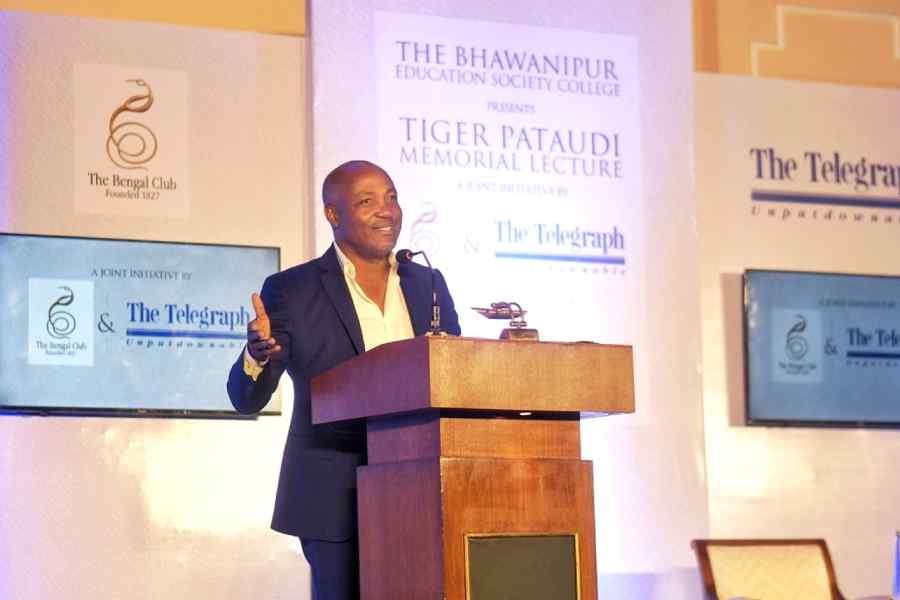“Brian Lara before Sachin Tendulkar. I like that little touch. Maybe it’s the only time that’s happened,” quipped Brian Lara while referring to the naming sequence of one of the gates at the Sydney Cricket Ground (SCG) in Australia that jointly honours him and the man he has been compared to endlessly.
If Winston Churchill had watched Brian Lara bat, he may well have described The Prince of Port of Spain as a “riddle wrapped in a mystery inside an enigma”. From Lara’s inimitable backlift to his freakishly elastic wrists to his gift of looking gorgeous at the crease even while getting out, the West Indian’s genius remains elusive more than 15 years after his retirement. But Churchillian hyperbole is not necessary to describe Lara’s performance at the 11th edition of the Tiger Pataudi Memorial Lecture on November 30, a joint initiative by The Bengal Club and The Telegraph, presented by The Bhawanipur Education Society College in association with The Oberoi Grand, Kolkata. During his stay at the lectern on Thursday evening, Lara replaced flamboyance with fandom (initially for Pataudi, but also for Kapil Dev, Sunil Gavaskar, Sachin Tendulkar and Virat Kohli) and disdain (towards bowlers) with deference (towards his audience), as he spent the best part of an hour tracing the history of individual greatness in Indian cricket without ever being too conscious of the occasion or himself.
‘Makes me shudder to think…’
For Indians, the word “lecture” usually carries distinctly boring overtones, from the classroom to the boardroom to the drawing room. But when married to the name of Tiger Pataudi, whose birthright was to be anything but boring, a lecture suddenly feels as much about entertainment as information. This impression has only been consolidated over the years, as the likes of Imran Khan (2012), Sourav Ganguly (2014), Kapil Dev (2015) and Bishan Singh Bedi (2017) have regaled attendees with their charisma and humour (sometimes unintended!). There have also been more solemn speeches, verging on academic presentations, from Greg Chappell (2013) and Mike Brearley (2016). David Gower (2019) was arguably the only one to hit the sweet spot between the two, before Lara took to the dais on a mild evening to have his shot on a pitch where he himself had to provide the spin, the swing and the bounce.
For someone used to mesmerising audiences from the get-go, Lara made a sedate start. He began by thanking the Pataudi family (who could not make it to the lecture) and by paying homage to Pataudi, whose “name has always fascinated me” and who “makes me shudder to think what he would’ve been capable of had he had all his faculties”. He proceeded to follow one of the lecture’s unspoken traditions by refreshing everyone’s memory of Tiger’s Test batting average of 35 — impressive for someone with two eyes, incredible for someone with one. Lara also issued an additional reminder about how the Nawab had done something that the Prince never could — take a Test wicket.
Following his paean to Pataudi, Lara pinned down the topic of his lecture — “individual success in a team sport”. The first bullet point of that topic was to heap praise on Virat Kohli, someone Lara said “was capable of anything”. Lara admitted to being most impressed by how Kohli has “changed the face of cricket with his commitment and discipline” before comparing Kohli and his current Indian teammates with the West Indies of the 1970s, “who were [also] loved everywhere they went”.
Tendulkar on another level
At this stage, the lecture began to feel more like a series of letters of recommendation, with Lara acting as the principal of the School of Cricketing Greatness. Next in line was Tendulkar, about whom Lara understandably felt most at ease. “Even though everyone compared us all the time, Sachin and I became friends very quickly,” said Lara, before generating more interest by switching from analysis to anecdotes. Lara recalled the first time he and Tendulkar had batted together, in an exhibition match in the early 1990s in Canada, representing the Rest of the World XI against Pakistan. During that game, rules had been set to bowl from no farther than 10 paces (owing to an astroturf surface and erratic pace and bounce). Once Pakistan started flouting those rules through Waqar Younis, a perturbed Lara had approached Tendulkar, only to receive the reply: “Don’t worry, Brian.” Younis was duly dispatched to the stands shortly after, leading Lara to exclaim: “This man [Tendulkar] is on another level.”
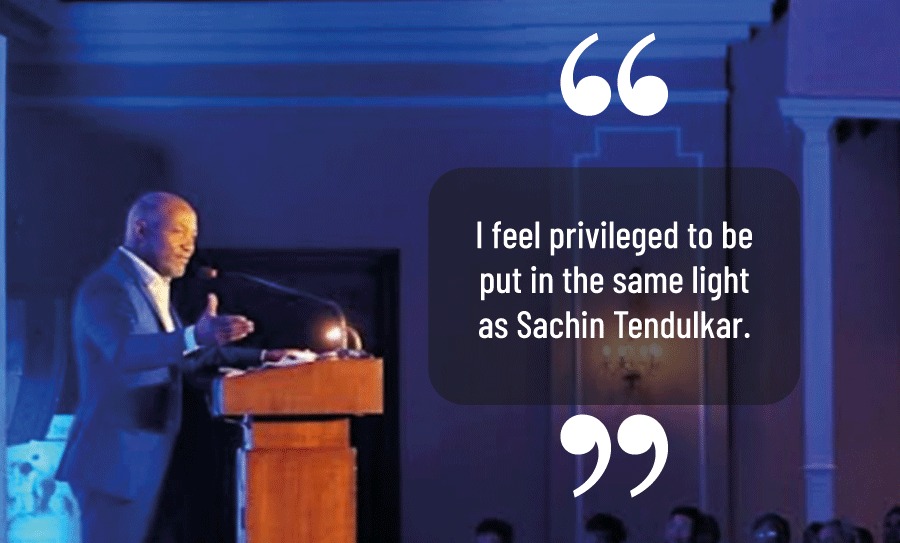
Photo: Soumyajit Dey
It was heartwarming to hear Lara admire Tendulkar without an iota of insecurity and without any intentions of slipping in a short sentence of self-celebration (which another elegant left-handed batter had done frequently on the same stage a few years ago!). The subsequent adulation for Kapil Dev and Gavaskar, however, felt stale by comparison, as if Lara, the overnight cricket historian, had diligently read out the Wikipedia summaries of two of India’s greatest cricketing champions. This is not to undermine Lara’ sincerity. It is to say that the time spent lavishing adjectives on Kapil Dev and Gavaskar could have been better spent digging deeper into Lara’s own psyche and going beyond cricketing cliches in explaining individual success. For instance, Lara could have chosen to reveal whether individual greatness calls for a certain element of selfishness, or whether a great player is entitled to chase personal milestones when the opportunity is right (Lara’s record-setting Test scores of 375 and 400 against England had produced drawn matches). Or, if in believing in one’s own greatness, one can find the right balance between humility and hubris.
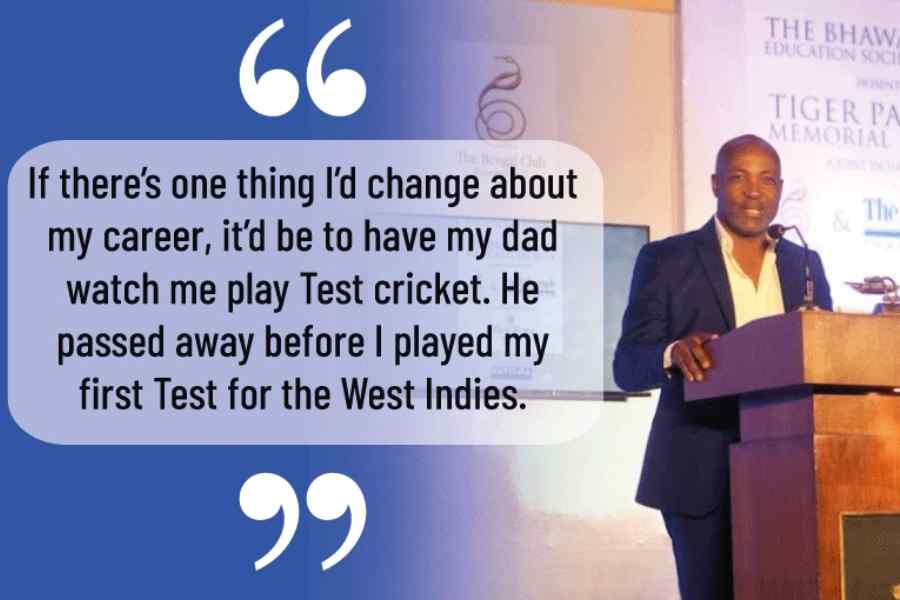
Photo: Soumyajit Dey
The biggest regret
Lara spoke about none of these, opting instead for a menu of jokes to wrap up his speech. A joke about there being no TV at his home in the ’60s, which led to him having 10 brothers and sisters (“my parents had nothing else to do at night!”). A joke about his kit bag being thrown out of the West Indian dressing room in his early days for the crime of placing his gear in the sacred spot reserved for Vivian Richards. A joke about Kapil Dev beating him at golf. The crowd in the ballroom of The Oberoi Grand indulged Lara generously, clapping along to his humour like they would have had he scorched one between cover and mid-off.
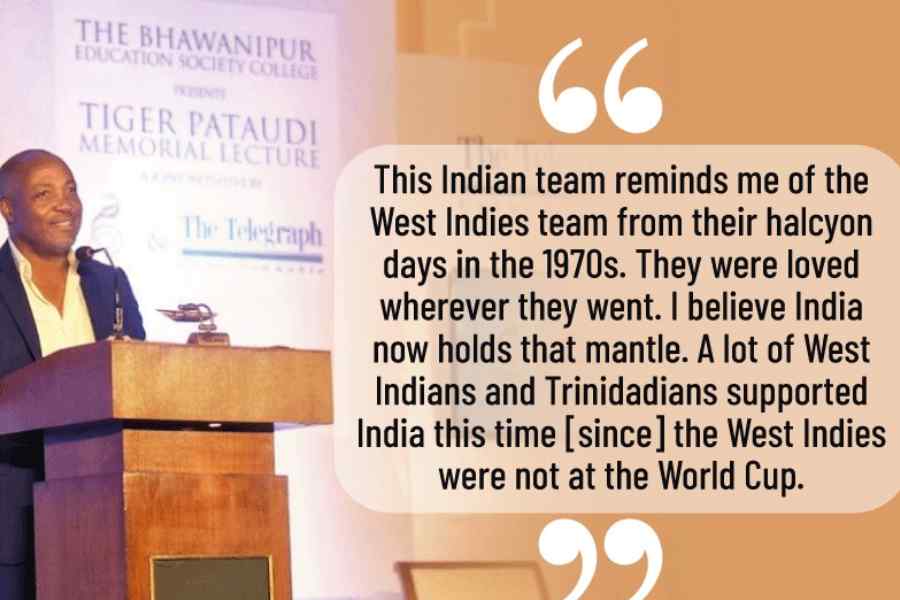
Photo: Soumyajit Dey
A different note arrived when Lara, somewhat unexpectedly, segued to the question of his biggest regret. Not winning the World Cup with the West Indies? Not playing the IPL? Not smashing 600 against England and converting Matthew Hoggard into a spinner? No. Rather, Lara’s biggest regret, in a rare moment of poignancy, was not having “my dad watch me play Test cricket. He passed away before I played my first Test for the West Indies”. Before the room had fully come to terms with the emotion of Lara’s admission, there was another joke, this time about eating duck in Australia and managing to avoid the same on the pitch.
By the time the lecture and the evening had drawn to a close, almost everyone had a smile on their face. Lara had done what he does best — entertain. As for the topic of his speech, the best example of that had already come before Lara had climbed a pair of short stairs to reach the stage. The example, after all, was a montage of Lara entertaining with the weapon of his choice. Not a mic but a cricket bat.
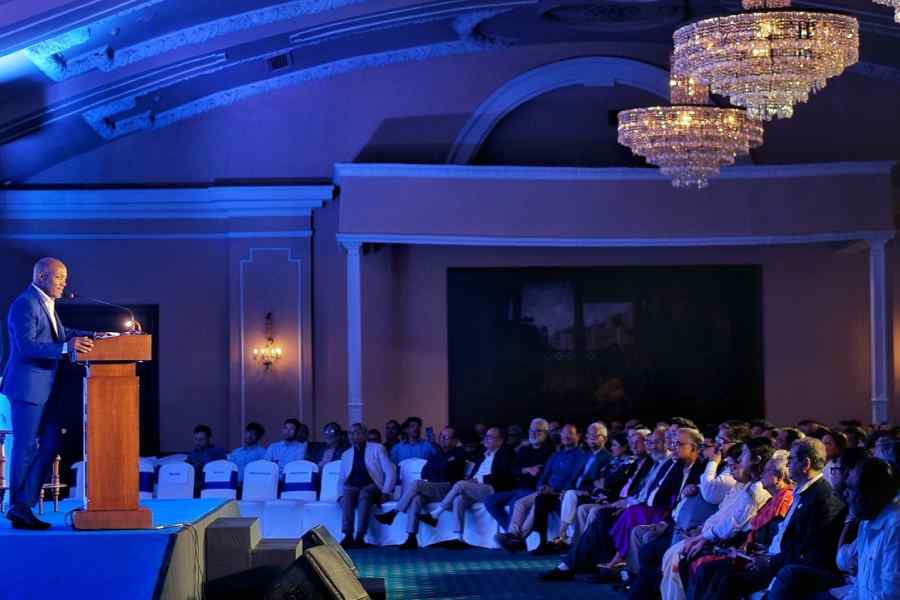
Brian Lara at the Tiger Pataudi Lecture. Photo: Soumyajit Dey

